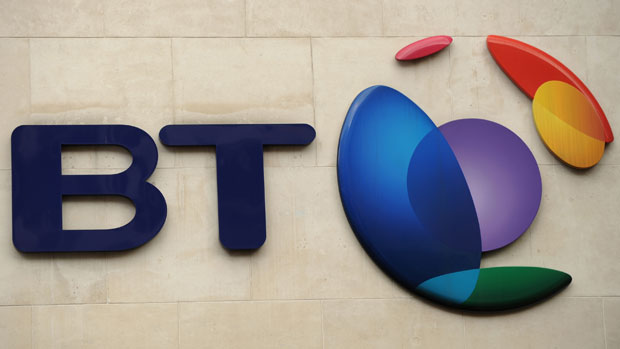BT and EE escape full mobile-auction ban
Ofcom bars duo from bidding for more "usable spectrum" capacity, but they can try for future 5G range

A free daily email with the biggest news stories of the day – and the best features from TheWeek.com
You are now subscribed
Your newsletter sign-up was successful
BT and its specialist mobile network EE have escaped a full ban on bidding for new mobile spectrum capacity, much to the annoyance of rival Three.
Under Ofcom proposals announced yesterday, the duo will be barred from acquiring any new airwaves in the 2.3ghz band - the "usable spectrum" that will be used to boost 4G signals, says the Financial Times.
However, they will be allowed to bid for the higher frequency 3.4ghz range "which will be used for future 5G services".
The Week
Escape your echo chamber. Get the facts behind the news, plus analysis from multiple perspectives.

Sign up for The Week's Free Newsletters
From our morning news briefing to a weekly Good News Newsletter, get the best of The Week delivered directly to your inbox.
From our morning news briefing to a weekly Good News Newsletter, get the best of The Week delivered directly to your inbox.
BT and EE together control around 45 per cent of the UK's usable spectrum. Ofcom said it was concerned that if the market became "more unbalanced, this could harm competition in the next few years", says The Guardian.
Vodafone has 28 per cent of the market, while O2 has 15 per cent and Three, owned by Hong Kong's Hutchison, 12 per cent.
Three, which has demanded the regulator cap spectrum ownership at 30 per cent and introduce quotas for smaller providers, said Ofcom has shown "it is not willing to make the big decisions needed to deliver the best outcome for the UK".
Allowing "BT and Vodafone to stockpile valuable mobile airwaves" puts "genuine choice for consumers at risk", added the company.
A free daily email with the biggest news stories of the day – and the best features from TheWeek.com
A spokesman for EE said it "doesn't agree that competition measures should be introduced for this auction" and that it is using its large spectrum to push 4G coverage to 95 per cent of the UK by 2020.
Three's anger also follows Ofcom's role in its blocked buyout of O2 on competition grounds.
The UK regulator lobbied the EU to block the agreed £10bn deal in May on the grounds that reducing the number of infrastructure-owning operators would harm competition.
However, BT's £12bn buyout of EE was allowed to go ahead as it was argued there was no corresponding effect on infrastructure ownership.
-
 How the FCC’s ‘equal time’ rule works
How the FCC’s ‘equal time’ rule worksIn the Spotlight The law is at the heart of the Colbert-CBS conflict
-
 What is the endgame in the DHS shutdown?
What is the endgame in the DHS shutdown?Today’s Big Question Democrats want to rein in ICE’s immigration crackdown
-
 ‘Poor time management isn’t just an inconvenience’
‘Poor time management isn’t just an inconvenience’Instant Opinion Opinion, comment and editorials of the day
-
 Labour shortages: the ‘most urgent problem’ facing the UK economy right now
Labour shortages: the ‘most urgent problem’ facing the UK economy right nowSpeed Read Britain is currently in the grip of an ‘employment crisis’
-
 Will the energy war hurt Europe more than Russia?
Will the energy war hurt Europe more than Russia?Speed Read European Commission proposes a total ban on Russian oil
-
 Will Elon Musk manage to take over Twitter?
Will Elon Musk manage to take over Twitter?Speed Read The world’s richest man has launched a hostile takeover bid worth $43bn
-
 Shoppers urged not to buy into dodgy Black Friday deals
Shoppers urged not to buy into dodgy Black Friday dealsSpeed Read Consumer watchdog says better prices can be had on most of the so-called bargain offers
-
 Ryanair: readying for departure from London
Ryanair: readying for departure from LondonSpeed Read Plans to delist Ryanair from the London Stock Exchange could spell ‘another blow’ to the ‘dwindling’ London market
-
 Out of fashion: Asos ‘curse’ has struck again
Out of fashion: Asos ‘curse’ has struck againSpeed Read Share price tumbles following the departure of CEO Nick Beighton
-
 Universal Music’s blockbuster listing: don’t stop me now…
Universal Music’s blockbuster listing: don’t stop me now…Speed Read Investors are betting heavily that the ‘boom in music streaming’, which has transformed Universal’s fortunes, ‘still has a long way to go’
-
 EasyJet/Wizz: battle for air supremacy
EasyJet/Wizz: battle for air supremacySpeed Read ‘Wizz’s cheeky takeover bid will have come as a blow to the corporate ego’